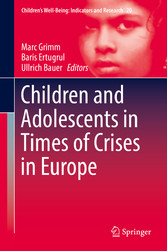
Children and Adolescents in Times of Crises in Europe

von: Marc Grimm, Baris Ertugrul, Ullrich Bauer
Springer-Verlag, 2019
ISBN: 9783030163310
Sprache: Englisch
214 Seiten, Download: 2564 KB
Format: PDF, auch als Online-Lesen
| Acknowledgments | 6 | ||
| Introduction: Children and Adolescents in Times of Crisis in Europe | 7 | ||
| Current State of Research | 8 | ||
| Complex Crises | 9 | ||
| The Contributions | 10 | ||
| References | 14 | ||
| Contents | 15 | ||
| About the Contributors | 17 | ||
| Part I: Methodological Challenges of a Child-Oriented Crises Research | 21 | ||
| Chapter 1: Theories for a Childhood and Youth-Related Crisis Research | 22 | ||
| Introduction | 22 | ||
| Social-Theoretical Recourse | 24 | ||
| Durkheim and Moral Crisis | 24 | ||
| Breaching or Crisis Experiments of Ethnomethodology | 26 | ||
| Bourdieu and the Crises of Dispositional Systems | 27 | ||
| Society Within the Subject and the Subject of Society | 29 | ||
| Problem-Related Convergences | 29 | ||
| Epistemological Divergences | 29 | ||
| Habitus as Analytical Concept | 30 | ||
| Conclusion | 32 | ||
| References | 33 | ||
| Chapter 2: Crises and Future Expectations from the Perspective of Children and Adolescents | 35 | ||
| Introduction | 35 | ||
| The Neoliberal Crisis: Bourdieu’s Social Theory and Its Empirical Access | 37 | ||
| Crisis Research: The Actors as Focus | 39 | ||
| Bourdieu’s Missing Developmental Perspective | 41 | ||
| Bourdieu’s Missing Perspective in Childhood and Adolescent Research | 42 | ||
| The Weight of the World on Children and Adolescents | 43 | ||
| Conclusion | 45 | ||
| References | 45 | ||
| Chapter 3: Epistemological Questions of Qualitative Crisis Research. Exploring the Attitudes of Children and Adolescents on Migration and Meritocratic Ideas of Society | 47 | ||
| Exploratory Interviews | 48 | ||
| Nisrin “Do They Just Sit Around at Home All Day?” | 49 | ||
| Johanna “The First Thing Is to Do Away with War…” | 51 | ||
| Exploring Children’s Subjectivity | 54 | ||
| Foundations of Childhood- and Adolescence-Centred Crisis Research | 56 | ||
| Children and Adolescents on the Subjective Level | 56 | ||
| Pedagogical Conditions | 57 | ||
| Conclusion | 58 | ||
| References | 58 | ||
| Part II: Impacts of Crises | 60 | ||
| Chapter 4: Insecure Right from the Start? Socialization Effects of Parental Self-Perceived Job Insecurity | 61 | ||
| Introduction | 61 | ||
| Job Insecurity and Its Currently Known Intergenerational Consequences | 63 | ||
| Socialization Effects of Parental Job Loss Worries on the Occupational Development of Adolescent Children | 65 | ||
| Data, Measures, and Analysis Strategy | 67 | ||
| Data and Sample | 67 | ||
| Measures | 67 | ||
| Analysis Strategy | 68 | ||
| Findings | 69 | ||
| Descriptive Results | 69 | ||
| Multivariate Results | 71 | ||
| Summary and Conclusion | 74 | ||
| References | 76 | ||
| Chapter 5: Child Wellbeing: From Crisis in Families to Crisis of Welfare | 79 | ||
| Introduction | 79 | ||
| Studies on Child Wellbeing and Family Change | 81 | ||
| Economic Crisis, Family Structure and Child Subjective Wellbeing | 84 | ||
| Incidence of Parenting on Child Subjective Wellbeing | 87 | ||
| Marital Status, Quality of Partner Relationships and Child Subjective Wellbeing | 87 | ||
| Socioeconomic Crisis, Parental Involvement and Child Subjective Wellbeing | 89 | ||
| Conclusions | 90 | ||
| References | 90 | ||
| Chapter 6: On the Extremes: Poverty of Young Adults in Greece and Germany (2008–2012) | 97 | ||
| Introduction | 97 | ||
| Poverty in Households with Young People | 99 | ||
| Household Structure and Poverty in Young Adulthood | 99 | ||
| Social Protection in the German and Greek Welfare States | 100 | ||
| Research Questions and Considerations for the Analysis | 101 | ||
| Data, Indicators and Methods | 102 | ||
| Poverty Profiles of Young People in Greece and Germany | 104 | ||
| Changes in the Poverty Risks of Young Adults by Household Context | 105 | ||
| Household Composition in Germany and Greece | 106 | ||
| Risk Factors of Relative Income Poverty and Material Deprivation | 106 | ||
| Decomposition of Changes in Poverty Risks in Times of Crisis | 111 | ||
| Discussion | 116 | ||
| References | 118 | ||
| Part III: Policy Responses and Public Discourses on Crises | 120 | ||
| Chapter 7: Transforming Children and Adolescents in Human Capital. Changes of Youth Policies in Post-Crisis Austria | 121 | ||
| Introduction | 121 | ||
| Human Capital Formation and Employability as Crisis Management | 123 | ||
| Developments and Tensions in (Early) Childcare in Austria | 127 | ||
| Institutional Developments | 127 | ||
| Emerging Tensions | 130 | ||
| Developments and Tensions in Policies for Adolescents in Austria | 131 | ||
| Institutional Developments | 131 | ||
| Emerging Tensions | 132 | ||
| Conclusions | 134 | ||
| References | 135 | ||
| Chapter 8: The German Child Poverty Discourse and its Rhetoric of Crisis | 138 | ||
| Introduction: Child Poverty as a Diverse Phenomenon | 138 | ||
| Minimum Change Approach Between Conservation and Evolution | 139 | ||
| Child Poverty as Virtue Poverty | 140 | ||
| Child Poverty as Educational Poverty | 141 | ||
| Maximum Change Approach Between Revolution and Progression | 143 | ||
| Child Poverty as Monetary Poverty | 144 | ||
| Child Poverty as Rights Poverty | 146 | ||
| The Link Between ‘Child Poverty’ and ‘Crisis’ | 148 | ||
| Virtue Poverty and the Economic Crisis | 148 | ||
| Educational Poverty and the Structural Crisis | 149 | ||
| Monetary Poverty and the Capitalism Crisis | 150 | ||
| Rights Poverty and the Refugee Crisis | 151 | ||
| Conclusion: The ‘Double Political Character’ of Child Poverty | 151 | ||
| References | 152 | ||
| Chapter 9: Global Social Policy on Children in the Global Economic Crisis | 155 | ||
| Introduction | 155 | ||
| Global Social Policy: Actors and Ideas | 156 | ||
| Global Social Policy in the Context of the Global Economic Crisis | 157 | ||
| Global Social Policy Crisis Ideas and the Role of Children | 159 | ||
| Comparing International Organisations’ Approaches: UNICEF, ILO, OECD and World Bank | 160 | ||
| United Nations International Children’s Emergency Fund (UNICEF) | 160 | ||
| Organisation for Economic Cooperation and Development (OECD) | 161 | ||
| International Labour Organization (ILO) | 162 | ||
| World Bank | 163 | ||
| Conclusions | 163 | ||
| References | 165 | ||
| Chapter 10: Policies of Crises in the European Union Youth Field: How a Political Agenda Shapes the Concept of Youth | 168 | ||
| Introduction | 168 | ||
| The Economic Crisis and Its Impact on European Youth | 169 | ||
| The Social Construction of European Youth | 170 | ||
| Individualisation of Youth and the “Entrepreneurial Self” | 171 | ||
| Youth Policy Approaches and the Concept of Youth: Existing Classifications | 172 | ||
| Youth Policy of the European Union | 174 | ||
| Addressing Youth as “Entrepreneurial Self”: The Concept of Youth in the EU Youth Strategy | 175 | ||
| The EU Youth Strategy Reflects Increasing Uncertainty and Risk of Youth in the Aftermath of the Crisis | 175 | ||
| Investing and Empowering as Core Objectives of the EU Youth Strategy | 176 | ||
| Promoting Creativity, Innovation, and Entrepreneurship | 177 | ||
| Skills Development and the “Project Me” | 178 | ||
| Conclusions | 178 | ||
| Limitation and Outlook | 179 | ||
| References | 180 | ||
| Part IV: Subjective Processing of Crises | 183 | ||
| Chapter 11: The Second Generation in Switzerland in Times of Crises: Biographies Between Meritocratic Promise and Experiences of Inequality and Insecurity | 184 | ||
| Structural Crises and Subjective Perceptions | 184 | ||
| Europe in Crisis – and Switzerland? | 186 | ||
| Immigration and Integration Policies Under the Prevailing Insecurity and Activation | 187 | ||
| A Biographical Longitudinal Study of Adolescence in the Context of Migration and Inequality | 188 | ||
| Biographies in the Contradiction Between Meritocratic Promise and Unequal Opportunities | 190 | ||
| Accentuations of the Contradictory Basic Constellation in the Shadow of the “Crisis” | 192 | ||
| Processes of Symbolic and Political-Legal Precarization | 192 | ||
| The Perception of Transnational Economic Disparities | 195 | ||
| Discussion: Adolescents’ Space of Opportunity in the Context of (Cross-Border) Social Inequalities | 197 | ||
| References | 199 | ||
| Chapter 12: Attitudes of Children and Adolescents in Times of Crisis: Empirical Findings from Germany Between 2015 and 2018 | 202 | ||
| The Analysis Context: Germany’s Political Situation Since the Arrival of Refugees in 2015 | 202 | ||
| Childhood-Related Attitude Research | 204 | ||
| Resentment Among Adolescents | 205 | ||
| Economy | 206 | ||
| Migration | 207 | ||
| Identities Within the Area of Tension | 209 | ||
| Democracy and Populism | 212 | ||
| Conclusion | 213 | ||
| References | 214 |







